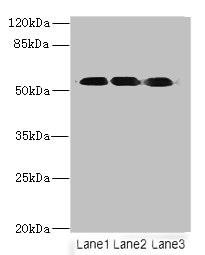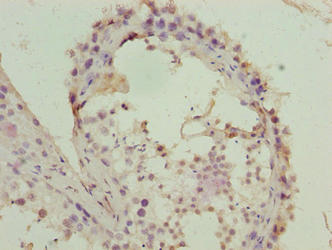FZR1 Antibody
-
货号:CSB-PA892473LA01HU
-
规格:¥440
-
促销:
-
图片:
-
Western blot
All lanes: FZR1 antibody at 6μg/ml
Lane 1: Hela whole cell lysate
Lane 2: Jurkat whole cell lysate
Lane 3: 293T whole cell lysate
Secondary
Goat polyclonal to rabbit IgG at 1/10000 dilution
Predicted band size: 56, 55, 45 kDa
Observed band size: 56 kDa -
Immunohistochemistry of paraffin-embedded human testis tissue using CSB-PA892473LA01HU at dilution of 1:100
-
-
其他:
产品详情
-
产品名称:Rabbit anti-Homo sapiens (Human) FZR1 Polyclonal antibody
-
Uniprot No.:Q9UM11
-
基因名:
-
别名:CDC20 like 1b antibody; CDC20 like protein 1 antibody; CDC20-like protein 1 antibody; CDC20C antibody; CDH1 antibody; Cdh1/Hct1 homolog antibody; Fizzy related protein 1 antibody; Fizzy related protein antibody; Fizzy related protein homolog antibody; Fizzy-related protein homolog antibody; Fizzy/cell division cycle 20 related 1 antibody; FYR antibody; FZR 1 antibody; FZR 2 antibody; Fzr antibody; FZR_HUMAN antibody; Fzr1 antibody; Fzr1 protein antibody; FZR2 antibody; HCDH 1 antibody; HCDH antibody; hCDH1 antibody; KIAA1242 antibody
-
宿主:Rabbit
-
反应种属:Human
-
免疫原:Recombinant Human Fizzy-related protein homolog protein (1-493AA)
-
免疫原种属:Homo sapiens (Human)
-
标记方式:Non-conjugated
本页面中的产品,FZR1 Antibody (CSB-PA892473LA01HU),的标记方式是Non-conjugated。对于FZR1 Antibody,我们还提供其他标记。见下表:
-
克隆类型:Polyclonal
-
抗体亚型:IgG
-
纯化方式:>95%, Protein G purified
-
浓度:It differs from different batches. Please contact us to confirm it.
-
保存缓冲液:Preservative: 0.03% Proclin 300
Constituents: 50% Glycerol, 0.01M PBS, PH 7.4 -
产品提供形式:Liquid
-
应用范围:ELISA, WB, IHC
-
推荐稀释比:
Application Recommended Dilution WB 1:500-1:2000 IHC 1:20-1:200 -
Protocols:
-
储存条件:Upon receipt, store at -20°C or -80°C. Avoid repeated freeze.
-
货期:Basically, we can dispatch the products out in 1-3 working days after receiving your orders. Delivery time maybe differs from different purchasing way or location, please kindly consult your local distributors for specific delivery time.
相关产品
靶点详情
-
功能:Substrate-specific adapter for the anaphase promoting complex/cyclosome (APC/C) E3 ubiquitin-protein ligase complex. Associates with the APC/C in late mitosis, in replacement of CDC20, and activates the APC/C during anaphase and telophase. The APC/C remains active in degrading substrates to ensure that positive regulators of the cell cycle do not accumulate prematurely. At the G1/S transition FZR1 is phosphorylated, leading to its dissociation from the APC/C. Following DNA damage, it is required for the G2 DNA damage checkpoint: its dephosphorylation and reassociation with the APC/C leads to the ubiquitination of PLK1, preventing entry into mitosis. Acts as an adapter for APC/C to target the DNA-end resection factor RBBP8/CtIP for ubiquitination and subsequent proteasomal degradation. Through the regulation of RBBP8/CtIP protein turnover, may play a role in DNA damage response, favoring DNA double-strand repair through error-prone non-homologous end joining (NHEJ) over error-free, RBBP8-mediated homologous recombination (HR).
-
基因功能参考文献:
- Cdh1-dependent degradation of FoxM1 is required to shut down transcriptional activation of mitotic regulators during exit from mitosis. PMID: 18758239
- Cdh1 reciprocally regulates the Rb pathway through competing with E2F1 to bind the hypophosphorylated form of Rb. PMID: 19477924
- Data report that a nuclear-localized portion of the stress-activated kinase JNK is degraded by the APC/C(Cdh1) during exit from mitosis and the G1 phase of the cell cycle. PMID: 20581839
- We identified the known APC/C regulator Cdh1 and the F-box protein Fbxl15 as specific modulators of N-cyclin B1-luciferase steady-state levels and turnover. Collectively, our studies suggest that analyzing the steady-state levels of luciferase fusion proteins in parallel facilitates identification of specific regulators of protein turnover. PMID: 28296622
- Findings document the differential expression, subcellular localization and cell-cycle-regulatory activity of alternatively spliced human CDH1 isoforms. PMID: 12797865
- upon infection of quiescent cells human cytomegalovirus not only activates the E2F-dependent G(1)/S transcription program but also facilitates protein accumulation of APC/C substrates by rapid Cdh1 dissociation PMID: 16138013
- Cell cycle regulation of Six1 occurs both transcriptionally and post-translationally via phosphorylation PMID: 17130831
- Cdh1 may act as an important component in tumor suppression and could be considered as a novel biomarker in breast cancer. PMID: 18381934
- Reduced Cdh1 levels have no effect on destruction of many APC/C substrates during mitotic exit but strongly and specifically stabilize Aurora kinases. PMID: 18976910
- Low Cdh1 expression is associated with breast cancer. PMID: 19350629
- Glycolysis-promoting enzyme 6-phosphofructo-2-kinase/fructose-2,6-bisphosphatase, isoform 3 (PFKFB3), is degraded by the E3 ubiquitin ligase APC/C-Cdh1. PMID: 20080744
- DDB1 modulates the function of APC/C(Cdh1) in a manner independent of the Cul4-DDB1 complex PMID: 20395298
- Proteolysis of Rad17 by Cdh1/APC regulates checkpoint termination and recovery from genotoxic stress PMID: 20424596
- APC/CCdh1 is a master G0/G1 regulator and involved in differentiation and development processes. (Review) PMID: 21497201
- The deubiquitinase USP37 binds CDH1 and removes degradative polyubiquitin from cyclin A. USP37 was induced by E2F factors in G1, peaked at G1/S, and was degraded in late mitosis. Phosphorylation of USP37 by CDK2 stimulated its full activity. PMID: 21596315
- Ect2 is subject to proteasomal degradation after mitosis, following ubiquitination by the APC/C complex and its co-activator Cdh1 PMID: 21886810
- studies uncover a cell-cycle-independent function of Cdh1, establishing Cdh1 as an upstream component that governs Smurf1 activity PMID: 22152476
- In senescent cells, the DNA damage response induces proteasomal degradation of G9a and GLP, histone methyltransferases, through Cdc14B- and p21(Waf1/Cip1)-dependent activation of APC/C(Cdh1) ubiquitin ligase. PMID: 22178396
- APC/CCdh1 is able to ubiquitylate E2F3A in vitro, and that the degradation of E2F3A is stimulated by Cdh1, but not by Cdc20. PMID: 22580460
- The effect of Cdh1 on E2F1 degradation is blocked upon DNA damage. PMID: 22580462
- show that the Gas2l3 protein is targeted for ubiquitin-mediated proteolysis by the APC/C(Cdh1) complex, but not by the APC/C(Cdc20) complex, and is phosphorylated by Cdk1 in mitosis PMID: 23469016
- Data indicate that regulation of Rad17 turnover is through the Cdh1/anaphase-promoting complex pathway in breast cancer cells. PMID: 23637229
- NEDL2 is a novel substrate of APC/C-Cdh1 as cells exit mitosis and functions as a regulator of the metaphase to anaphase transition PMID: 24163370
- Results showed evidence that Wip1 underwent Cdh1-dependent proteolysis during mitosis and sustained Wip1 activity during mitosis, resulting in mitotic delay at the metaphase to anaphase transition. PMID: 25649870
- Using biochemistry and live cell imaging of single cells s found that Cdh1 knockdown (kd) leads to strong nuclear stabilization of the substrates cyclin A and B and deregulated kinetics of DNA replication. PMID: 26455319
- Low Cdh1 expression may be important in AML biology by contributing to the differentiation block and response to therapy depending on differences in the microenvironment and the additional genetic background. PMID: 27374082
- APC/C(Cdc20), and APC/C(Cdh1) act successively to ensure that the disappearance of licensing inhibitors coincides exactly with a peak of Cdt1 and Cdc6. PMID: 23775192
- The Cells lacking Cdh1 have been shown to accumulate deoxyribonucleic acid (DNA) damage, suggesting that it may play a previously unrecognized role in maintaining genomic stability. PMID: 21768287
- APC/C(Cdc20) or APC/C(Cdh1) complexes regulate RAP80 stability during mitosis to the G(1) phase, and these events are critical for a novel function of RAP80 in mitotic progression. PMID: 22426463
- the sequential actions of the APC-c(Cdc20) and APC-c(Cdh1) ubiquitin ligases regulate the clearance of Mps1 levels and are critical for Mps1 functions during the cell cycle in human cells. PMID: 20729194
- Study shows that nuclear PTEN interacts with APC/C, promotes APC/C association with CDH1, and thereby enhances the tumor-suppressive activity of the APC-CDH1 complex. PMID: 21241890
- APC-Cdh1 establishes a stimulus-response relationship that promotes S phase. PMID: 24356446
- The levels of CDC20 and CylinB1 increased and the levels of Ku70 and APC3 decreased after irradiation. APC/C(Cdh1) is involved in regulation of radiosensitivity in human NPC CNE-1 cells. PMID: 28004426
- Data show that FZR1 (Fzr), a cofactor of the multi-subunit E3 ligase complex anaphase-promoting complex/cyclosome (APC/C), represents PMID: 27655696
- APC/C and pRB interact with each other via the co-activator of APC/C, FZR1, providing an alternative pathway of regulation of G1 to S transition by pRB using a post-translational mechanism. Both pRB and FZR1 have complex roles and are implicated not only in regulation of cell proliferation but also in differentiation, quiescence, apoptosis, maintenance of chromosomal integrity and metabolism. PMID: 27402801
- FZR1 inhibits BRAF oncogenic functions via both APC-dependent proteolysis and APC-independent disruption of BRAF dimers, whereas hyperactivated ERK and CDK4 reciprocally suppress APC(FZR1) E3 ligase activity PMID: 28174173
- These findings identify a dynamic interplay between FZR1 and BRAF with strong implications for cell-fate determination and the tumor suppressor role of FZR1 PMID: 28373167
- results suggest that reduction of FZR1 increases therapeutic sensitivity of B-ALL and that transient rather than tonic inhibition of FZR1 may be a therapeutic strategy. PMID: 28143883
- results define a new APC/C(Cdh1) function that prevents cell cycle resumption after prolonged replication stress by inhibiting origin firing, which may act as an additional mechanism in safeguarding genome integrity. PMID: 26939887
- APC(Cdh1) inactivation is the commitment point when cells lose the ability to return to quiescence and decide to progress through the cell cycle. PMID: 27368103
- Data show that CDC20 homolog 1 (Cdh1) is O-GlcNAcylated in cultured cells. PMID: 27080259
- Anaphase-promoting complex/cyclosome-CDH1, rather than Cdc20, promotes the degradation of BRSK2 in vivo. PMID: 23029325
- Anaphase-promoting complex/cyclosome-Cdh1 coordinates glycolysis and glutaminolysis with transition to S phase in human T lymphocytes. PMID: 20921411
- Cdh1-depleted HeLa cells reduced stress fiber formation significantly. The GTP-bound active Rho protein was apparently decreased in the Cdh1-depleted cells. PMID: 20530197
- FZR1 is not required for the completion of mitosis, but is an important regulator of G1 phase and is required for efficient DNA replication in human and mouse somatic cells. PMID: 19861496
- Destruction-box specificities of APC/C(fzy) and APC/C(fzr)& successive activation of APC/C by fzy & fzr establish the temporal substrate degradation pattern, explaining why some endogenous RXXL substrates are degraded by fzy & others by fzr complexes. PMID: 12198152
- Results indicate that Cdh1 mediates its own degradation by activating the anaphase-promoting complex/cyclosome to degrade itself. PMID: 15029244
- Retinoic acid downregulates Rae1, hence facilitating APC(Cdh1)-mediated Skp2 degradation leading to the arrest of cell cycle progression and neuroblastoma differentiation. PMID: 18212744
- during endocycles, APC/C Fzr/Cdh1 functions to reduce the levels of the mitotic cyclins and Geminin in order to facilitate the relicensing of DNA replication origins and cell cycle progression PMID: 18321983
- In response to genotoxic stress in G2, the phosphatase Cdc14B translocates from the nucleolus to the nucleoplasm and induces the activation of the ubiquitin ligase APC/C(Cdh1), with the consequent degradation of Plk1, a prominent mitotic kinase. PMID: 18662541
显示更多
收起更多
-
亚细胞定位:[Isoform 2]: Nucleus.; [Isoform 3]: Cytoplasm.
-
蛋白家族:WD repeat CDC20/Fizzy family
-
组织特异性:Isoform 2 is expressed at high levels in heart, liver, spleen and some cancer cell lines whereas isoform 3 is expressed only at low levels in these tissues.
-
数据库链接:
HGNC: 24824
OMIM: 603619
KEGG: hsa:51343
STRING: 9606.ENSP00000378529
UniGene: Hs.413133
Most popular with customers
-
-
YWHAB Recombinant Monoclonal Antibody
Applications: ELISA, WB, IF, FC
Species Reactivity: Human, Mouse, Rat
-
Phospho-YAP1 (S127) Recombinant Monoclonal Antibody
Applications: ELISA, WB, IHC
Species Reactivity: Human
-
-
-
-
-























